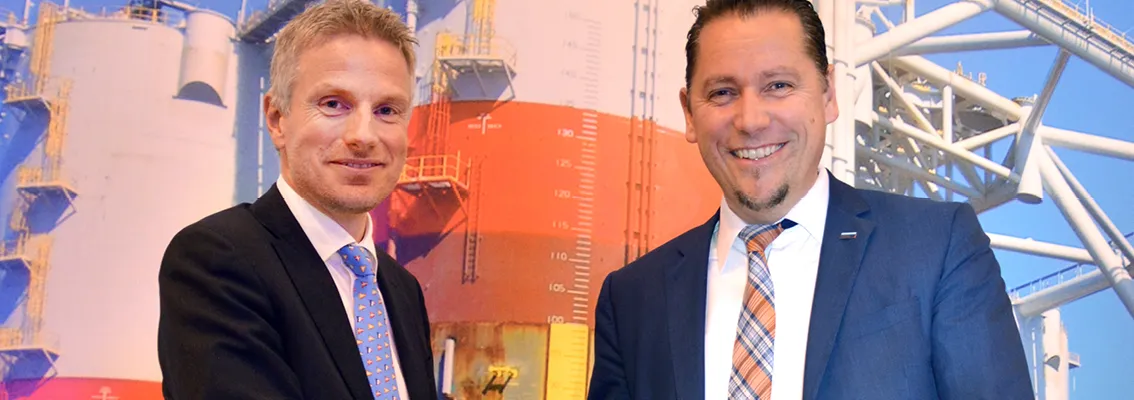Houston, 7th May 2014: DNV GL, the world’s leading ship and offshore classification society and one of the world’s leading technical risk service providers, has acquired Marine Cybernetics, the leading company for third-party testing of computer control systems. The acquisition expands DNV GL’s scope of services in the offshore and maritime industries.
Marine Cybernetics was established in 2002 as a spin-off from the Norwegian University of Science and Technology (NTNU). Based in Trondheim, Norway, the company introduced the concept of Hardware-In-the Loop-Testing (HIL) to the maritime and offshore industries. HIL testing significantly reduces the risk of accidents, off-hire costs and non-productive time due to software-related issues.
“The decision to invest in Marine Cybernetics was driven by the increasing importance of software dependent systems in ensuring safe, reliable and efficient operations. We have now come to a point where we cannot only rely on testing and verifying hardware,” says Remi Eriksen, DNV GL Group Executive Vice President and COO. “We see that an increasing number of incidents, many of them severe, are caused by software- related issues. There’s a weak spot in the way the offshore and marine industries work to ensure total system quality. That weak spot is getting bigger every day, but we’re going to rectify this,” he continues, adding: “Marine Cybernetics has unique technology and processes for the third-party testing and verification of computer-based control systems. This will be a game changing platform to enhance safety and increase operational efficiency in the offshore and maritime industries.”
A requirement of software-system certification was introduced into the offshore classification rules by DNV GL some time ago. Currently, the market for the third- party testing and certification of control systems is small but has huge potential.
According to Eriksen, the short-term synergies will facilitate a global roll out of HIL testing services via DNV GL’s worldwide network, allowing Marine Cybernetics to reach even more customers across the globe. A mid-term perspective is a combination of service offerings. “As such, we strive to actively drive the further development of the concept of classification. And a longer term goal is to use the competencies and technologies in other asset heavy and software intensive industries, such as the power generation, transmission and distribution industries,” says Eriksen.
Marine Cybernetics Chief Executive Officer Stein Eggan says, “This is an important milestone for Marine Cybernetics and true recognition of our capabilities as the leading provider of third- party testing and verification of control system software for the maritime and offshore industries. Since DNV GL is the leading global ship and offshore classification society and the leading technical assurance provider to the oil and gas industry, this transaction will also strengthen our global delivery capabilities and continued technological development, benefitting both companies' customers and industry partners as well as creating interesting opportunities for our employees.”
He continues, “We have enjoyed a good working relationship with DNV GL for many years and look forward to bringing our companies together to continue to build a sustainable business in the software integrity field, strongly vested in shared philosophies and core values.”
“Main shareholder Statoil Technology Invest (STI) first supported Marine Cybernetics through its LOOP product development programme in 2003 and then invested in 2005, recognizing the importance of being able to independently test critical control system software on vessels and rigs. We are pleased to see that MC has found a good home in DNV GL,” says Richard Erskine, Managing Director of STI.
Besides Statoil Technology Invest and the Kristian Gerhard Jebsen Group, the shares of Marine Cybernetics were held by Marine Cybernetics employees and management as well as the former founders, who are now completely out of the company . To reflect its cross-industry relevance and strategic importance to DNV GL, Marine Cybernetics will become an independent business unit within the DNV GL Group.
*********
Contacts:
Marine Cybernetics:
Stein Eggan - Stein.eggan@marinecyb.com
DNV GL Group Communications:
Media Director Tore Høifødt – tore.hoifodt@dnvgl.com
Media and Communications Manager Stuart Brewer – stuart.d.brewer@dnvgl.com
At OTC:
Svein Inge Leirgulen - Svein.Inge.Leirgulen@dnvgl.com
Elinor Turander – Elinor.turander@dnvgl.com
*********
About DNV GL
Driven by its purpose of safeguarding life, property and the environment, DNV GL enables organisations to advance the safety and sustainability of their business. We provide classification and technical assurance services along with software and independent expert advisory services to the maritime, oil & gas and energy industries. We also provide management system certification services to customers across a wide range of industries. Operating in more than 100 countries, our 16,000 professionals are dedicated to helping our customers make the world safer, smarter and greener.
For more information: www.dnvgl.com
About Marine Cybernetics
Marine Cybernetics was established in 2002 as a spin-off from the Norwegian University of Science and Technology (NTNU) in Trondheim, and introduced the concept of Hardware-In-the Loop-Testing (HIL) to the marine and offshore industry. During the last 12 years, the company has established itself as the leading company for third party testing of operational and safety critical computer control systems used in various maritime and offshore operations, and has been working with major E&P companies, rig companies, vessel owners, system producers, and shipyards.
Marine Cybernetics has performed HIL tests on 140 different vessels, including mobile offshore drilling units (drill ships, semi-submersibles, jack-ups), construction/diving vessels, shuttle tankers and offshore service vessels.
For a new-build, HIL testing significantly reduces the risk of software related problems during commissioning, start-up and first-year operations. For a vessel in operation, HIL testing can also be used to assess control system software upgrades to secure a problem-free installation onboard. HIL testing technology can also save time and cost in troubleshooting of known software issues onboard the vessel. In short, HIL testing significantly reduces the risk of incidents, accidents, off-hire costs and non-productive time due to software related issues.
Marine Cybernetics employs nearly 70 people worldwide, with headquarter in Trondheim, Norway and international offices in Rio de Janeiro, Brazil and Houston, USA.
For more information: www.marinecyb.com
